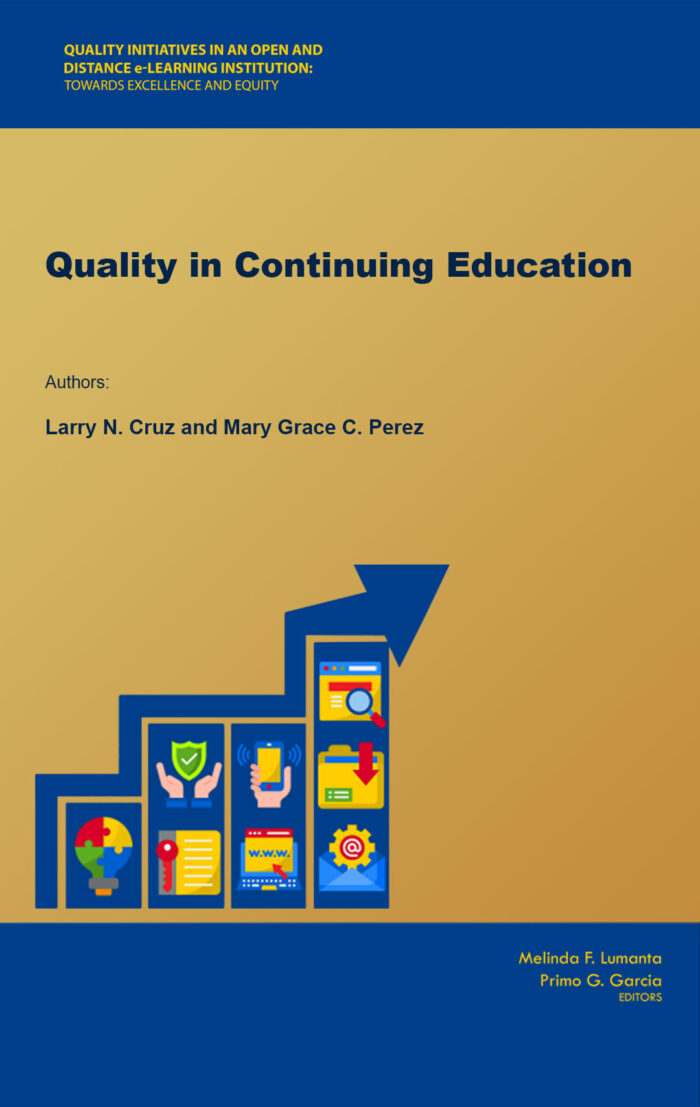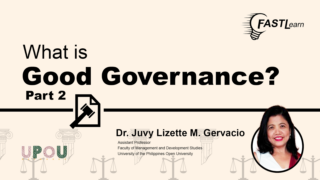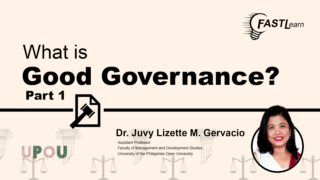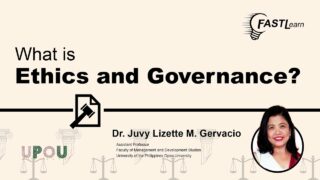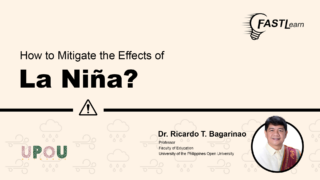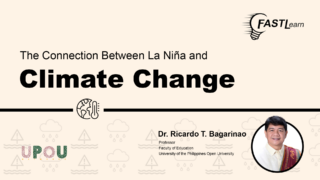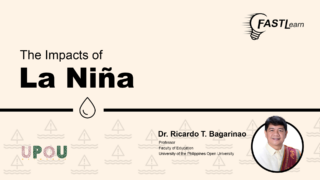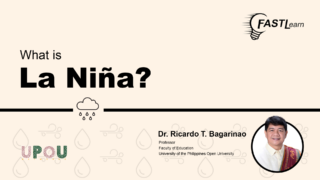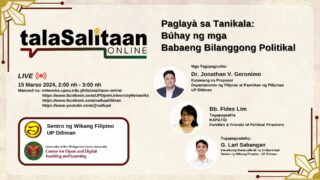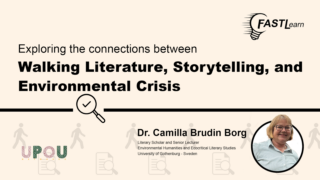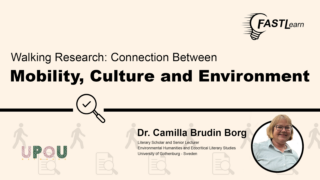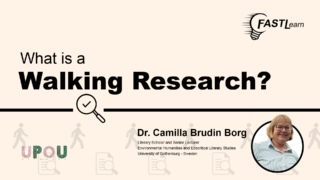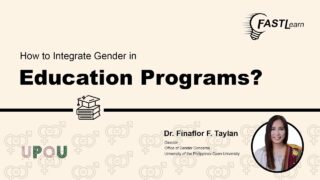One of the stated objectives in the resolution establishing the University of the Philippines Open University (UPOU) is to provide opportunities for alternative access to quality higher education by offering baccalaureate and post-baccalaureate degree programs as well as non-formal courses by distance education. The development and delivery of non-formal courses in UPOU aim to institutionalize a system of continuing education to sustain professional growth and promote lifelong learning especially for those who cannot leave their jobs or homes for full-time studies. This chapter presents the practices in course development and delivery of the UPOU’s non-formal courses as part of its Continuing Education Program (CEP). Patterned after the development and delivery of formal programs and following the four- step quality assurance continuing education program (QACEP) framework, the chapter discusses the processes and procedures in the (1) planning and design, (2) implementation and delivery, (3) monitoring and evaluation, and (4) continuous improvement of UPOU’s CEP.
The United Nations Educational, Scientific, and Cultural Organization (UNESCO) “believes that education is a human right for all throughout life and that access must be matched by quality” (UNESCO, 2019, Education transforms lives section). It is also believed that lifelong learning is mandatory in one’s personal and professional growth. Whether one is a businessman, an instructor, a homemaker, an employee, or a practicing professional, one must continue to develop his/her skills and learn new ones to keep abreast of the demands of our ever-changing society.
In 1987, the Asia-Pacific Programme of Education for All defined continuing education as follows:
…continuing education as a broad concept which includes all
of the learning opportunities all people want or need outside
of basic literacy education and primary education…. which
implies that it is for literate youth and adults; it is responsive
to needs and wants; it can include experiences provided by
the formal, non-formal and informal education sub-sectors;
and, it is defined in terms of the opportunity to engage in
lifelong learning after the conclusion of primary schooling or
its equivalent. (UNESCO, 1993, “Chapter 1: The Context of
Continuing Education” section)
In this information age, one cannot remain stagnant in one’s education, be it formal (degree program), non-formal, or informal in nature. Skill sets that are of high demand today can become obsolete tomorrow. Our continuously evolving society and technologically-advancing industry constantly require brand new skills from the workforce and therefore pose a great challenge to the higher education institutions (HEIs) where streamlined knowledge and skills are expected to be obtained/acquired from. Mismatch in the available jobs versus skills of the labor force has become an emerging national and global issue.
Continuing education, being generally needs-oriented, is a key to narrowing the gap while creating a learning opportunity for those individuals who wish to pursue a particular passion or interest, accelerate in or shift from their career, or are planning for future business endeavors, etc. Continuing education, regardless of one’s chosen provider, is also found to be an effective tool to address/supplement/augment inadequacies in formal education. Delivered through different formats (classroom-type or technologically-mediated) and now also offered by various organizations (training centers, company-based, community-based, etc.) within and outside the academic institutions, the quality of Continuing Education Programs (CEP) becomes a major concern.
In response to this, the University of the Philippines Open University’s Faculty of Management and Development Studies (UPOU-FMDS) has offered continuing education non-formal courses that are delivered online for worldwide accessibility. These courses were developed and delivered by experts from the academe and practitioners from the industry and managed by an open and distance e-learning (ODeL) university. In this chapter, we reiterate the process of quality assuring degree/formal course development as applied to the non-degree/non-formal programs.
The offering is in line with one of the stated objectives in the resolution establishing the UPOU: to provide opportunities for alternative access to quality higher education by offering baccalaureate and post-baccalaureate degree programs as well as non-formal courses by distance education.
The development and delivery of non-formal courses in UPOU aim to institutionalize a system of continuing education to sustain professional growth and promote lifelong learning, especially for those who cannot leave their jobs or homes for full-time studies.
The UPOU began managing the course development and delivery of its non- formal courses immediately after its establishment in 1995. In the early years, the UPOU, in general, took care of the promotion of the courses; the Office of the University Registrar (OUR) was in charge of the admission and registration of enrollees; and, the former campus-based Schools for Distance Education (SDEs) took care of the development and delivery of these courses.
In 1999, the newly organized discipline-based Faculties of Studies assumed a more proactive role as it coordinated the admission and registration up to the completion of learners, with appropriate support from relevant UPOU offices/units.
Currently, the UPOU, specifically the FMDS, has 10 non-formal courses, grouped into three clusters under its CEP, that are up and running:
A. Human and Social Development Cluster:
1. Caring for the Child with Special Needs (CCSN);
2. Financial Management in Nursing Practice (FMNP); and,
3. Research Utilization in Nursing Administration (RUNA).
B. Environmental Cluster:
1. Integrating Climate Change Adaptation and Disaster Risk
Management Policies, Plans and Investments toward Inclusive and
Sustainable Agricultural and Rural Development (CCA & DRM);
2. Organic Agriculture (OA); and,
3. Responding to Climate Risks in Agriculture and Natural Resources
Management (RCRANRM).
C. Entrepreneurship Cluster:
1. Introduction to Electronic Commerce (eCom);
2. New Enterprise Planning (NEP);
3. Personal Entrepreneurial Development (PED); and,
4. Simplified Accounting for Entrepreneurs (SAfE).
The development and delivery of non-formal courses have evolved throughout the years. To date, it has generated a total of 4,185 enrollees and 2,444 course completers.
In recognition of the contribution of the non-formal courses to the lifelong learners, in particular, and the university, in general (as an extension and/or public service initiative), and with the Certificate of Accreditation awarded to UPOU-FMDS for having completed the requirements for Continuing Professional Development (CPD) as CPD Provider in accordance with the “Implementing Rules and Regulations of Republic Act No. 10912, otherwise known as the CPD Act of 2016” set forth by the Professional Regulation Commission in Resolution No. 1032, Series of 2017, the CEP of FMDS continuously develops and improves the non-formal courses, with the aim of sustaining its relevance and ensuring its development and delivery.
The non-formal courses under the UPOU’s CEP are fee-based since these are 12 to 16-week teacher-facilitated courses while UPOU’s Massive Open Online Courses (MOOCs) are free since these are only 4 to 6-week non-teacher-facilitated courses. Both, however, are extension and/or public service initiatives of the university.
The University College Cork (2011) proposed a framework that is specific for CEP based on the Plan-Do-Check-Act (PDCA) cycle. It is a problem-solving process emphasizing that continuous improvement must start with “careful planning, lead to effective action, go through monitoring and improvement, and revisit the planning stage again resulting in an improved activity” (p.22). Therefore, the framework is organized into four parts with the following phases:
• Planning and Design
• Implementation and Delivery
• Programme Monitoring
• Programme Improvement
Following the QACEP framework, the UPOU-FMDS-CEP adopts the practices and procedures in the respective phases below:
Planning and Design
Course Proposal Development
The proponent submits a course proposal to the Faculty Dean through the Continuing Education Committee (CEC) following the UP System’s format/template of the proposal for the new program with some modifications. Every course offered in the program begins with a course proposal. It has to be based on the felt/identified needs of its target course participants as clearly defined in its course objectives and expected learning outcomes. Moreover, the proposed course must be highly relevant to merit recommendation for course development. To validate its presumed need, a market survey is required from the course proponent, which forms part of the course proposal. Projected costs of course development and course delivery must also be included in the proposal for the allocation of funds.
To ensure the quality of its continuing education non-formal courses, the FMDS, through the Faculty Dean, constituted the CEC which is tasked to review and recommend policies and procedures for the development and delivery of continuing education non-formal courses. The committee is also tasked to review and recommend continuing education non-formal course proposals for development and delivery. With the CEP Program Development Associate (PDA) as Chair and selected CEP Course Coordinators as members, course proposals are submitted for the committee’s evaluation and endorsement. They convene to review and recommend course proposals and discuss updates and/or concerns on currently offered courses. This, along with other good practices, helps maintain the quality of each course in the program.
The CEC reviews the proposal based on the merits of the course, market needs, budget, and financial analysis.
Once approved, the CEC recommends to the Faculty Dean the development and delivery of the course through the UPOU’s Office of Academic Support and Instructional Services (OASIS) and FMDS’s CEP, respectively.
Course Development
The CEP through OASIS adopts UPOU’s policies and procedures in the development of the course following the contract for resource-based course wrap-around course materials. As indicated in the contract, the resource-based course package refers to a detailed study guide, to both on-line and off-line resources considered to be the core set of materials for a course. If the production of video and audio materials are needed, UPOU shall finance the production thereof following a previously approved budget proposal.
CEC-approved course proposals will be endorsed to the Dean of the Faculty which will then be referred to OASIS through a formal letter addressed to the office head. Mandated to assist in the planning and development of courses and preparation of instructional materials, OASIS plays an important role in the entire course development cycle. It is also tasked to make the necessary request to the UPOU legal office to prepare the contract of appointment of the course development team, which consists of coursewriter/s (i.e., content expert/s), course reader, instructional designer, multimedia specialist, etc. Course writing will commence as soon as the contract is signed and will be completed on or before the indicated schedule. The team works closely to best attain the course’s defined objectives. The expected output is a well- written course module designed for effective online learning.
The CEP adopts the OASIS instructional design process and/or resource- based course package approach (Arinto & Bonito, 2015) as key steps in developing the modules in UPOU as follows:
1. planning the course module which includes reviewing the course objectives and course outline; organizing the course content into specific modules, and defining the learning objectives per module;
2. selecting learning resources;
3. designing learning activities;
4. preparing the study guide that specifies the learning objectives for studying the set of resources, the key concepts covered, the relevance and significance of each learning resource included, and how learners should study the learning resources provided;
5. creating assignments for individual and collaborative as well as formative and summative learning activities; and,
6. writing the course guide specifying the learning objectives, course outline, course materials, schedule of learning activities, and assessment scheme/plan.
Implementation and Delivery
Course Delivery
Once developed, the Faculty Dean endorses the delivery of the course to the PDA of the CEP.
CEP then adopts the FMDS’s policies and procedures in the delivery of the course following the schedule of offering which is January to May and July to November for the first and second terms of the calendar year, respectively.
The CEP Schedule of Course Offerings for the current and upcoming calendar year are posted and regularly updated on the UPOU website to make them accessible to the wider public.
Identification and Appointment of Course Coordinator (Teacher)
Course Coordinators are identified and appointed from a pool of experts coming from the academe and the industry. As a quality measure, priority is given to those who had excellently completed a non-formal course under the CEP. Once appointed, they are expected to review the course materials to be used in the offering of the course; prepare a course guide (using the UPOU course guide template); a complete set of assignments (with assignment guides); create the online course site or virtual classroom on UPOU’s MyPortal; and, handle at least one tutorial section of the course. Prior to appointment, they undergo a Faculty-In-Charge (FIC) Orientation where the key concepts in ODeL and the roles of an online teacher are discussed.
Figure 1
CEP course development process
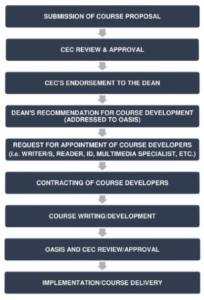
Admission
Applicants are advised to submit the following documents to the FMDS-CEP mailer <[email protected]> (as scanned copy) or through courier/mail (hardcopy) on or before the deadline.
1. Correctly and completely accomplished admission form with photo and signature
a. Personal data
b. Employment background
c. Educational background
2. Photocopy or scanned copy of proof of highest educational attainment (diploma or transcript of records)
– Minimum academic entry requirement is high school graduate
3. Proof of payment of enrollment fee composed of application fee and course fee
Registration
Interested course participants are to register online through the CEP Online Registration System linked to the course details of each non-formal course on the FMDS microsite. Prior to enrollment, all CEP online registrants shall receive an email announcement on the details of course offerings, with complete instructions on how to enroll in the course they registered in. Only those applicants who have met the minimum admission requirements of the course and completely submitted required documents shall be accepted in the program.
Documentary requirements may be personally submitted to the FMDS office, sent through posted mail/courier, or online via FMDS-CEP mailer within the enrollment duration. Submission of requirements will be acknowledged upon receipt and shall be carefully checked before processing. Details of officially enrolled students will be encoded in the CEP Class List and will then be shared with the MyPortal administrator for the issuance of MyPortal log-in credentials (username and password). It will be received by the student one week before the start of classes or as soon as the course site is up. Enrollment confirmation, along with the UPOU Student Guide to MyPortal, will be emailed to the students as well. Learners must all be on board on or before classes commence. All student concerns are directed to the FMDS-CEP mailer <[email protected]>, which acts as the program’s learner support.
Opening and Course Orientation
Opening and course orientation is conducted and is also done online through the CEP Online Course Orientation site created in the MyPortal. All course orientation videos and other student-related resources are uploaded to the said site to help guide the students in their learning journey throughout the course.
Closing Ceremony
At the end of each term, CEP conducts Closing Ceremonies to honor and recognize its completers and top students from each course. This is held at UPOU Headquarters and also available online via live-streaming for those who cannot be physically present in the program.
Monitoring and Evaluation
At the Faculty level, the Continuing Education Committee reviews and recommends policies and procedures for the development and delivery of continuing education non-formal courses. It also reviews and recommends continuing education non-formal course proposals for development and delivery.
At the Program level, an online questionnaire for learners’ evaluation of course delivery, course coordinator, and his/her teaching effectiveness is administered every end of the term (May and November of each year), results of which are shared with the respective course coordinators for improvement purposes. The CEP Team, composed of the PDA and Project Staff, also conducts regular meetings to discuss updates and formulate action plans on issues and concerns in course proposal review, course development, and course delivery.
Adopting the UPOU degree programs’ student evaluation of teachers, the UPOU-FMDS-CEP’s learners’ evaluation assesses the course guide, learning resources, learning activities, discussion forums, student learning, learner support, course site, and course coordinators.
In addition, the PDA and Project Staff of the CEP are given manager access in the respective non-formal course sites for monitoring, and administrative and technical assistance purposes.
Figure 2
CEP applicants’ registration to course completion
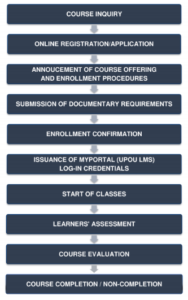
Continuous Improvement
Based on the Program and Faculty level evaluations, the CEP continuously develops and improves the non-formal course development and delivery under the program, in particular and the CEP, in general through the program improvement initiatives of the FMDS.
In 2017, FMDS-CEP embarked on developing/redeveloping non-formal courses using the resource-based course package (RBCP) approach. The RBCP, normally applied in degree programs of the university, is intended for course developers to plan the course module; select learning resources; design learning activities; prepare the study guide; create assignments; and, write the course guide.
As a follow-through, in 2018, a program review and planning workshop was conducted to review and improve the development and delivery of non-formal courses. Towards improving its course offerings, automation/programming of course delivery from application for admission to certification of course completers was proposed and designed.
Similarly, the CEP courses, alongside the degree programs of the FMDS were considered for evaluation during the strategic planning workshop of the Faculty in 2019. As one of the participating programs, the UPOU-FMDS-CEP is expected to prepare program revision proposals looking into the responsiveness of the program structure and requirements to learners’ needs, connections between and among courses, vertical and horizontal alignment, openness/flexibility of the program; course redevelopment plan; submission of article to the FMDS Journal; and, development of new non-formal course/s.
With reference to the QACEP framework which fosters the development of a continuous improvement approach, the following important points about ensuring quality in CEP are noted.
In planning and design, the CEC is tasked to review and recommend non-formal courses for development. With the committee, the proposals are assessed based on the merits of the course, market survey, budget, and financial analysis. With the adoption of the OASIS’s instructional design and/or resource-based course package approach as key steps in developing the modules, course developers/redevelopers are able to plan the course module, select learning resources, design learning activities, prepare the study guide, create assignments, and write the course guide.
As for the implementation and delivery, the regular schedule of offering which is January to May and July to November for the first and second terms of the calendar year, respectively, facilitates administrative and technical preparations and arrangements in course delivery. The identification and appointment of Course Coordinators from a pool of experts coming from the academe and the industry ensure the availability of qualified teachers and/or alternates. An applicant who had excellently completed a non-formal course under the CEP is given priority in the selection of a Course Coordinator. This helps in ensuring that the teacher is familiar with how open and distance e-learning works. Prior to their appointment, course coordinators participate in the FIC orientation where the key concepts in ODeL and the roles of an online teacher are discussed. The constitution of the CEC, with the PDA of the CEP as Chair and selected Course Coordinators as members, enables the review and recommendation of policies and procedures for the delivery of continuing education non-formal courses.
In terms of the monitoring and evaluation, the access given to the PDA and Project Staff in the respective non-formal course sites enables monitoring and provision of administrative and technical assistance to the Course Coordinators and learners. The conduct of regular meetings of the CEP enables the discussion of updates and formulation of action plans on issues and concerns related to the course delivery. The administration of an online survey questionnaire for learners’ evaluation of course delivery (course guide, learning resources, learning activities, discussion forums, student learning, learner support, course site), and course coordinator and his/her teaching effectiveness every end of the term (May and November of each year), results of which are shared with the respective Course Coordinators, helps improve the course delivery.
The participation of the CEP in the program improvement initiatives of FMDS, such as the development/redevelopment of non-formal courses using the resource-based course package approach, program review and planning workshop, and strategic planning workshop, enables the continuous enhancement of the non-formal course development and delivery.
In order to further improve the quality system for CEP non-formal course development and delivery, it is recommended that the adoption of the tried and tested course development and delivery of UPOU formal or degree courses/programs and the four-step QACEP framework such as planning and design, implementation and delivery, monitoring and evaluation, and continuous improvement be sustained. The ultimate aim should be the enhancement of the development and delivery of non-formal courses under the CEP and it is important that stakeholders are engaged in the process.
Faculty of Management and Development of Studies. (2019). FMDS planning and implementation of academic assessment and development plans based in iAADS++ (API 2019 project progress report). University of the Philippines Open University.
University College Cork. (2011). Quality assurance for continuing education programmes: A handbook for higher education institutions. University College Cork. https://www.qacep.eu/PublicDeliverables/QACEP_ Handbook_web%20version.pdf
United Nations Educational, Scientific, and Cultural Organization. (1993). Principal regional office for Asia and the Pacific: Appeal training materials for continuing education personnel (Atlp-Ce) (Vol. 1). Asia- Pacific Programme of Education for All.
United Nations Educational, Scientific, and Cultural Organization. (2019). Education transforms lives. https://en.unesco.org/themes/education/
Cruz, L. N., Perez, MG. C. (2020). Quality in Continuing Education. In Quality Initiatives in an Open and Distance e-Learning Institution: Towards Excellence and Equity (pp. 119-132). Los Baños, Laguna: UP Open University.
